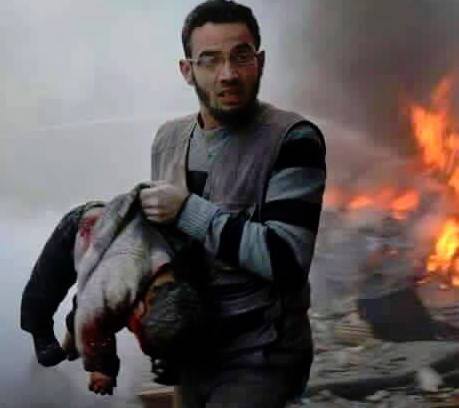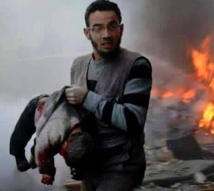Fourteen people were killed when a bus they were travelling in was hit on the Castello road, a key rebel supply route out of Aleppo, the civil defence said.
At least 43 other civilians were killed in regime strikes on neighbourhoods in the city's rebel-held east, said the civil defence, known as the White Helmets.
"There are people under the rubble and we're still looking for the missing," said a volunteer who gave his name as Khaled.
AFP footage showed a building in the city's east whose front had been blown off and bulldozers clearing debris from the roads.
A man wearing medical gloves stood in a room surrounded by white body bags, one with blood seeping through.
Official news agency SANA said rebel rocket fire killed two children in the regime-controlled west of the city.
The Britain-based Syrian Observatory for Human Rights said the Castello road was now "effectively cut".
"All movement is targeted, be that buses or bystanders," its head Rami Abdel Rahman said.
The observatory later said that regime air strikes killed at least 15 civilians in the Boleel area controlled by Islamic State outside Deir Ezzor city in eastern Syria.
It added that rebel shelling on Friday killed 10 civilians, including a woman and two children in Aleppo’s regime-controlled western districts.
- 'Security challenges' -
Nearly 600,000 people are estimated to live under siege in Syria, most of them encircled by forces of President Bashar al-Assad's regime, whose approval the UN says is needed to deliver aid by air.
Last month the UN said that if it did not see an improvement on aid access to besieged areas by June 1, it would task its food agency to carry out drops.
Syria on Friday agreed to partial aid deliveries to Moadamiyeh, Daraya and Douma, which are besieged by regime forces, the UN office of humanitarian affairs said.
Some diplomats however dismissed the move, saying such approvals had been granted in the past and failed to materialise on the ground.
The UN will on Sunday present a formal request to the Syrian government to approve airdrops where land access has been denied, diplomats at a closed UN Security Council meeting said.
Officials have stressed the challenges and risks of aid operations in the skies above a country at war.
UN spokesman Stephane Dujarric said helicopters would have to be used to transport aid to 15 of 19 besieged areas that include densely populated towns.
- Advance on IS -
Allowing aid into areas under siege is key to the resumption of peace talks on ending the five-year war that has killed 280,000 Syrians and displaced millions.
A truce brokered by Russia and the United States between the government and non-jihadist rebels has been violated nearly continuously around Aleppo.
More than 300 civilians were killed in Aleppo in two weeks from April 22 as rebels pounded regime-controlled neighbourhoods with rocket and artillery fire and the regime hit rebel areas with air raids.
In north Syria, meanwhile, regime forces backed by Russia on Friday advanced towards a bastion of the Islamic State group east of its Syria de facto capital of Raqa city, the Observatory said.
The advance came after a US-backed Kurdish-Arab alliance pressed an offensive last week towards the same town of Tabqa from the opposite direction.
The alliance is also advancing towards the strategic IS-held town of Manbij north of the town.
The US military said the Syrian rebels advancing on Islamic State fighters in Manbij have seized more than 40 square miles (100 square kilometres) this week.
A rebel victory there would inflict one of the largest strategic defeats on the IS group since it proclaimed its rule over territory in Iraq and Syria two years ago.
The US-led coalition since Thursday has dropped ammunition, light weapons and anti-tank weapons to Syrian rebels, as they try to prevent IS jihadists from entering the town of Marea north of Aleppo city, the Observatory said.
A US official confirmed the ammunition drops, but denied that they also contained weapons.
----------------------------------------------------------------------------------------------------------
At least 43 other civilians were killed in regime strikes on neighbourhoods in the city's rebel-held east, said the civil defence, known as the White Helmets.
"There are people under the rubble and we're still looking for the missing," said a volunteer who gave his name as Khaled.
AFP footage showed a building in the city's east whose front had been blown off and bulldozers clearing debris from the roads.
A man wearing medical gloves stood in a room surrounded by white body bags, one with blood seeping through.
Official news agency SANA said rebel rocket fire killed two children in the regime-controlled west of the city.
The Britain-based Syrian Observatory for Human Rights said the Castello road was now "effectively cut".
"All movement is targeted, be that buses or bystanders," its head Rami Abdel Rahman said.
The observatory later said that regime air strikes killed at least 15 civilians in the Boleel area controlled by Islamic State outside Deir Ezzor city in eastern Syria.
It added that rebel shelling on Friday killed 10 civilians, including a woman and two children in Aleppo’s regime-controlled western districts.
- 'Security challenges' -
Nearly 600,000 people are estimated to live under siege in Syria, most of them encircled by forces of President Bashar al-Assad's regime, whose approval the UN says is needed to deliver aid by air.
Last month the UN said that if it did not see an improvement on aid access to besieged areas by June 1, it would task its food agency to carry out drops.
Syria on Friday agreed to partial aid deliveries to Moadamiyeh, Daraya and Douma, which are besieged by regime forces, the UN office of humanitarian affairs said.
Some diplomats however dismissed the move, saying such approvals had been granted in the past and failed to materialise on the ground.
The UN will on Sunday present a formal request to the Syrian government to approve airdrops where land access has been denied, diplomats at a closed UN Security Council meeting said.
Officials have stressed the challenges and risks of aid operations in the skies above a country at war.
UN spokesman Stephane Dujarric said helicopters would have to be used to transport aid to 15 of 19 besieged areas that include densely populated towns.
- Advance on IS -
Allowing aid into areas under siege is key to the resumption of peace talks on ending the five-year war that has killed 280,000 Syrians and displaced millions.
A truce brokered by Russia and the United States between the government and non-jihadist rebels has been violated nearly continuously around Aleppo.
More than 300 civilians were killed in Aleppo in two weeks from April 22 as rebels pounded regime-controlled neighbourhoods with rocket and artillery fire and the regime hit rebel areas with air raids.
In north Syria, meanwhile, regime forces backed by Russia on Friday advanced towards a bastion of the Islamic State group east of its Syria de facto capital of Raqa city, the Observatory said.
The advance came after a US-backed Kurdish-Arab alliance pressed an offensive last week towards the same town of Tabqa from the opposite direction.
The alliance is also advancing towards the strategic IS-held town of Manbij north of the town.
The US military said the Syrian rebels advancing on Islamic State fighters in Manbij have seized more than 40 square miles (100 square kilometres) this week.
A rebel victory there would inflict one of the largest strategic defeats on the IS group since it proclaimed its rule over territory in Iraq and Syria two years ago.
The US-led coalition since Thursday has dropped ammunition, light weapons and anti-tank weapons to Syrian rebels, as they try to prevent IS jihadists from entering the town of Marea north of Aleppo city, the Observatory said.
A US official confirmed the ammunition drops, but denied that they also contained weapons.
----------------------------------------------------------------------------------------------------------









 Home
Home Politics
Politics











